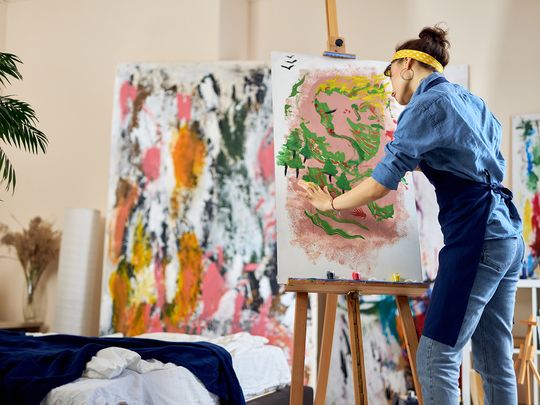
‘Art is the daughter of freedom’ — Friedrich Schiller
Art is a strong mode of expression, capable of transcending cultural and linguistic constraints, of discovering what it means to be human. Art can be bold or exquisite, simple, or complex, and is one of the earliest modes of human expression rooted in artistic inventions and transformations.
It can convey defiance and rebellion in remarkable ways; rebellion and dream. It will initiate debates, put subject matters into the public domain, reveal exploitation, and point out new worlds: influence people deeper and more effectively than political and academic dialogue, drive them to tears, laugh, and act.
Artists, intellectuals, and women often find themselves on the front lines of resistance against fundamentalist ideologies, and reactionary forces that seek to maintain a stranglehold on truth and power, often at the expense of human dignity.
In the face of such oppression, art can be perceived as a disruptive force, challenging societal norms and religious laws, pushing boundaries, and igniting controversy. Musicians, in particular, are frequently marginalised and subjected to various forms of persecution, ranging from harassment to imprisonment.
Yet, within this turbulent landscape, lies a profound wellspring of human creativity — an enduring legacy of artistic expression that transcends borders and defies conventional limitations. Despite the obstacles they face, artists persist in their pursuit of innovation, continually uncovering new avenues for harnessing the transformative power of creativity.
Speaking truth to power
In every brushstroke, every verse, and every performance, lies the potential to shape narratives, provoke introspection, and challenge the status quo. This reservoir of artistic ingenuity serves as a beacon of hope, offering glimpses of possibility amid adversity and oppression.
In the face of repression, artists wield their craft as a weapon of resistance, amplifying voices that refuse to be silenced and shedding light on the injustices that plague society. Their work serves as a testament to the resilience of the human spirit, inspiring others to dare to imagine a world where freedom reigns supreme and creativity knows no bounds.
The progressive English poet Shelley saw the poets as the world’s unrecognised legislators: the future is present as the plant lies in the seed; and art has the power to understand the future, that of freedom, plurality, and unification. In the same way, artists can be seen as contributing to the workings of civil society as important but underestimated.
Artists have played their part everywhere and across all times by exploring the human experience, in particular in times of conflict, injustice, and turmoil, in standing up for human rights and human dignity. It is no wonder why those who remain engaged in destroying the human spirit are terrified of their liberating and uncontrolled ability to speak truth to power.
Where the media is dominated, art is the last voice of liberty; a channel for dissidence, an account of alternative stories, and alternative futures rather than official sources. When women’s voices are suppressed, the self-expression of women is a rejection of the rigid limits on the position of men and women.
Seed for an improved future
Where culture is built on injustice, art offers a seed for an improved future. The artistic process itself provides a feeling of inner independence that lays the foundations for calling for greater freedom.
In many countries musicians who oppose political repression and inequality are incarcerated to suppress voices that can report injustice and convey hope and dictators want to hide their forms of oppression as much as they want to stamp out change.
However, individual freedom can be different from collective freedom. As Salvador Dali once stated: “You know, Dali spent two months in jail in Spain, and these two months were the most enjoyable and happy in my life. Before my jail period, I was always nervous, and anxious. The people put me in jail, and my life became divine.”
That raises the question if repression can cause creativity. Theoretically, suppressed rage or emotions can be a creative catalyst for a long time. One means of exorcising emotional emotions is after all to canalise them to art.
In conclusion, I think art is a strong mode of expression, which can connect people; through misery or joy. Repressing it can be either devastating or very good in terms of producing art in a creative form.
The association between arts and ethics has a long past. The arts influence human identities and cultures, and their interactions with each other. As forms of public art, the arts can aid in the ethical life of a society.
Maram Saleh, a Bahraini law student, finds inspiration in the realms of research and writing








